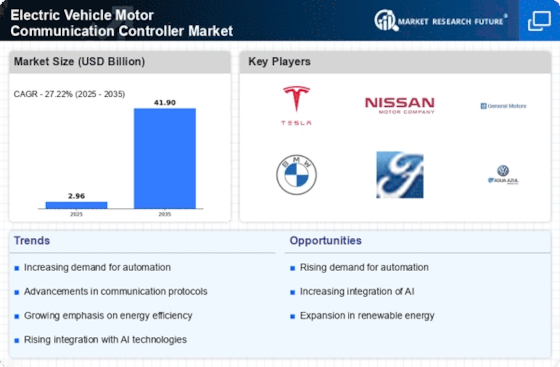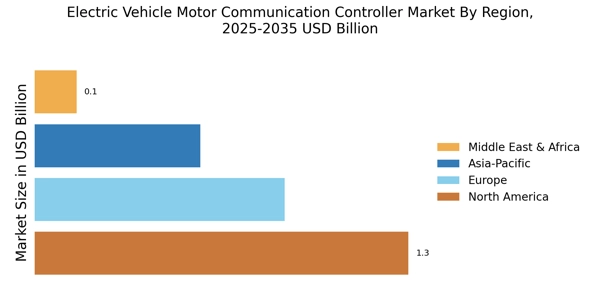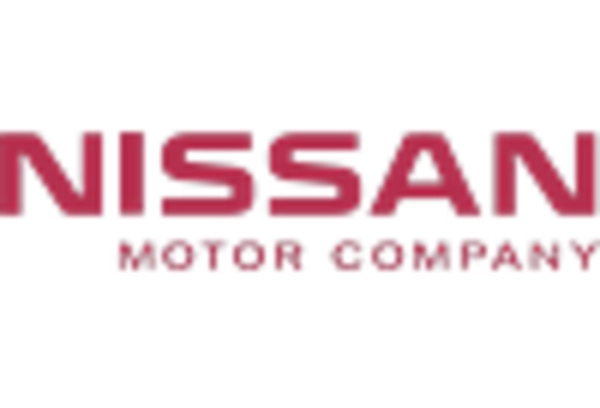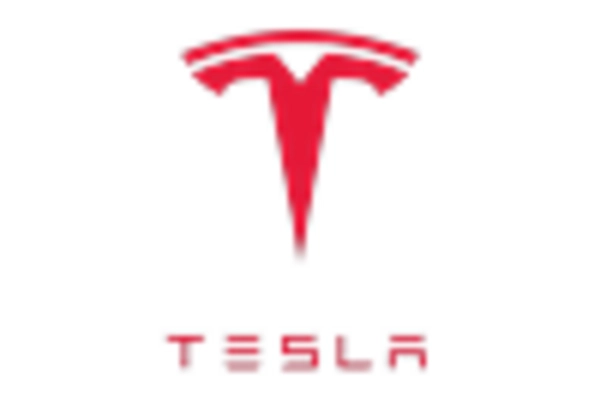Rising Demand for Electric Vehicles
The increasing consumer preference for electric vehicles (EVs) is a primary driver for the Electric Vehicle Motor Communication Controller Market. As more individuals and businesses seek sustainable transportation options, the demand for EVs is projected to rise significantly. According to recent data, the global electric vehicle sales are expected to reach over 30 million units by 2030. This surge in EV adoption necessitates advanced motor communication controllers to ensure efficient operation and performance. The Electric Vehicle Motor Communication Controller Market is thus positioned to benefit from this trend, as manufacturers strive to meet the growing need for reliable and effective communication systems within electric drivetrains.
Government Initiatives and Regulations
Government policies and regulations aimed at promoting electric vehicle adoption are significantly influencing the Electric Vehicle Motor Communication Controller Market. Many countries are implementing stringent emission standards and offering incentives for EV purchases, which in turn drives the demand for electric vehicles. For instance, various regions have set ambitious targets for phasing out internal combustion engine vehicles, thereby creating a favorable environment for EVs. This regulatory landscape compels manufacturers to invest in advanced motor communication technologies to comply with new standards and enhance vehicle efficiency. Consequently, the Electric Vehicle Motor Communication Controller Market is likely to experience robust growth as stakeholders adapt to these evolving regulations.
Focus on Autonomous Driving Technologies
The pursuit of autonomous driving technologies is reshaping the Electric Vehicle Motor Communication Controller Market. As automakers invest heavily in self-driving capabilities, the need for reliable communication between vehicle systems becomes paramount. Motor communication controllers play a crucial role in ensuring that various components, such as sensors and actuators, operate seamlessly together. The market for autonomous vehicles is projected to grow exponentially, with estimates suggesting that by 2030, the market could reach over 500 billion dollars. This growth trajectory indicates a substantial opportunity for the Electric Vehicle Motor Communication Controller Market, as manufacturers seek to develop advanced communication solutions that support autonomous functionalities.
Increased Investment in EV Infrastructure
The expansion of electric vehicle infrastructure is a vital driver for the Electric Vehicle Motor Communication Controller Market. As charging stations and related facilities proliferate, the need for efficient communication systems within electric vehicles becomes increasingly critical. Investments in charging infrastructure are expected to exceed 100 billion dollars by 2030, reflecting a commitment to supporting the EV ecosystem. This infrastructure development not only enhances the convenience of EV ownership but also necessitates the integration of advanced motor communication controllers to optimize charging processes and vehicle performance. Thus, the Electric Vehicle Motor Communication Controller Market stands to gain from these infrastructural advancements, as they create a more robust environment for electric vehicles.
Technological Advancements in Communication Systems
Technological innovations in communication systems are propelling the Electric Vehicle Motor Communication Controller Market forward. The integration of advanced communication protocols, such as CAN, LIN, and Ethernet, enhances the interaction between various vehicle components. These advancements facilitate real-time data exchange, improving vehicle performance and safety. As the automotive sector increasingly adopts smart technologies, the demand for sophisticated motor communication controllers is likely to escalate. Market data indicates that the adoption of Ethernet-based communication in vehicles is expected to grow at a compound annual growth rate of over 20% in the coming years, further underscoring the importance of these technologies in the Electric Vehicle Motor Communication Controller Market.

















